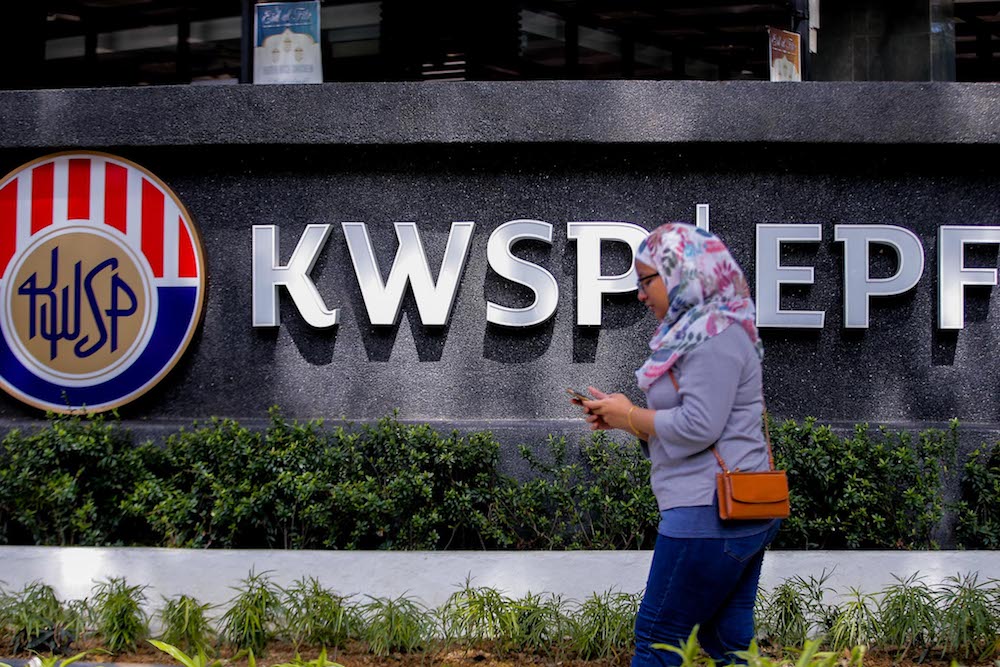KUALA LUMPUR, Sept 19 — The Employees Provident Fund (EPF) recorded a gross investment income of RM15.12 billion for the second quarter (Q2) ended June 30, 2020.
The retirement fund said equities contributed 54 per cent, or RM8.11 billion, to total gross income.
Fixed income instruments contributed RM6.17 billion while real estate and infrastructure accounted for RM0.47 billion and money market instruments RM0.37 billion, it said in a statement today.
The EPF said net investment income came in at RM13.46 billion after the cost write-down on listed equities, a prudent practice by the fund in ensuring that its long-term investment portfolio remains healthy.
Chief executive officer Tunku Alizakri Alias said the extremely volatile and challenging conditions seen from the early part of 2020 showed no signs of normalising as ongoing issues, such as the US-China trade tensions and low oil prices, remained unresolved and Covid-19 continued to run havoc in unprepared countries around the world.
Major economies had gone into lockdown and the closed borders meant that supply chains were disrupted, causing slowdowns in many sectors and industries, he said.
“The EPF’s Strategic Asset Allocation (SAA) framework that guides us in how we structure our investments and portfolio served us well during the tumultuous first half of the year. For example, our exposure in fixed income instruments enabled us to ride out the initial slump at the beginning of the quarter.
“We then saw an upward movement in equities towards the end of the quarter when both the FTSE Bursa Malaysia KLCI (FBM KLCI) and the global markets started to improve as economies gradually but cautiously reopened,” he said.
Moving forward, he said the EPF remained cautious as a second Covid-19 wave remained a possibility which would have a major negative multiplier impact on the already weak economic conditions faced by many countries which had yet to come out of the first wave.
Its SAA allocates 51 per cent to fixed income instruments, 36 per cent to equities, 10 per cent to real estate and infrastructure, and three per cent to money market instruments as a framework to optimise its long-term returns within tolerable risk limits.
The EPF noted that its overseas diversification strategy guided by the SAA had also helped add value to its overall performance.
As at end-June 2020, its investment assets stood at RM929.64 billion, of which 30 per cent was invested in overseas investments.
As of Q2 2020, 39 per cent of the total gross investment income recorded was contributed by the EPF’s overseas investments.
“The overseas income was driven by a recovery across global equity markets in the second quarter, allowed the EPF to ride out the slump during the first quarter of the year. Fixed income also contributed higher gains due to the low yield environment, which provided more opportunity for the fund to realise its gains,” it said.
Looking into the remaining half of 2020, Tunku Alizakri said the fund was maintaining a cautious stance as even though more countries were easing their quarantine restrictions and markets reopening for business, the promise of a vaccine for Covid-19 would not be fulfilled in the immediate future.
“In light of the unprecedented situation, we believe that we have managed to deliver a satisfactory performance, balancing the pressing liquidity needs of our members against the long-term responsibility of ensuring financial adequacy at retirement and sustainable returns on investment.
“Moving forward, it will be even more crucial for the EPF to continue investing in fundamentally strong assets, especially those companies which have shown an ability to pivot in adapting to the new norm,” he said.
During the movement control order (MCO) period, the fund extended a series of emergency relief measures to help ease the financial burden faced by both members and employers.
This included the i-Lestari Withdrawal facility, which allows members to make monthly withdrawals of between RM50 and RM500 from April 2020 to March 2021 subject to the available balance in their Account 2.
As at June 30, the EPF had approved 4.35 million applications with a cumulative withdrawal between April and June 2020 worth RM3.79 billion.
The EPF said it had also received a total of 37,888 applications (up to July 3) for the Employer Covid-19 Assistance Programme (e-CAP), which allows employers to defer and restructure their share of contributions.
A total of 10,528 applications were approved, amounting to RM70.4 million. This was on the back of an extension of the monthly deadline for employers to remit their mandatory EPF contributions for March 2020 and subsequently for the months of May to December 2020, it said.
In the same period, the EPF also reduced the upfront fees charged by fund management institutions for a period of 12 months ending April 30, 2021, with investments made through agents slashed to a maximum of 1.5 per cent from a maximum of three per cent while no upfront fees were imposed for investments transacted through i-Invest via the EPF i-Akaun.
On another note, Tunku Alizakri said the EPF remained committed to accelerating the adoption of environmental, social and governance (ESG) criteria as a core part of our investment decision-making process.
“In light of increasing uncertainties and volatilities becoming a norm, strong ESG practices will become a requirement as we believe that it will enable economies, industries and companies to be more adaptable and resilient in times of crisis,” he added. — Bernama



















